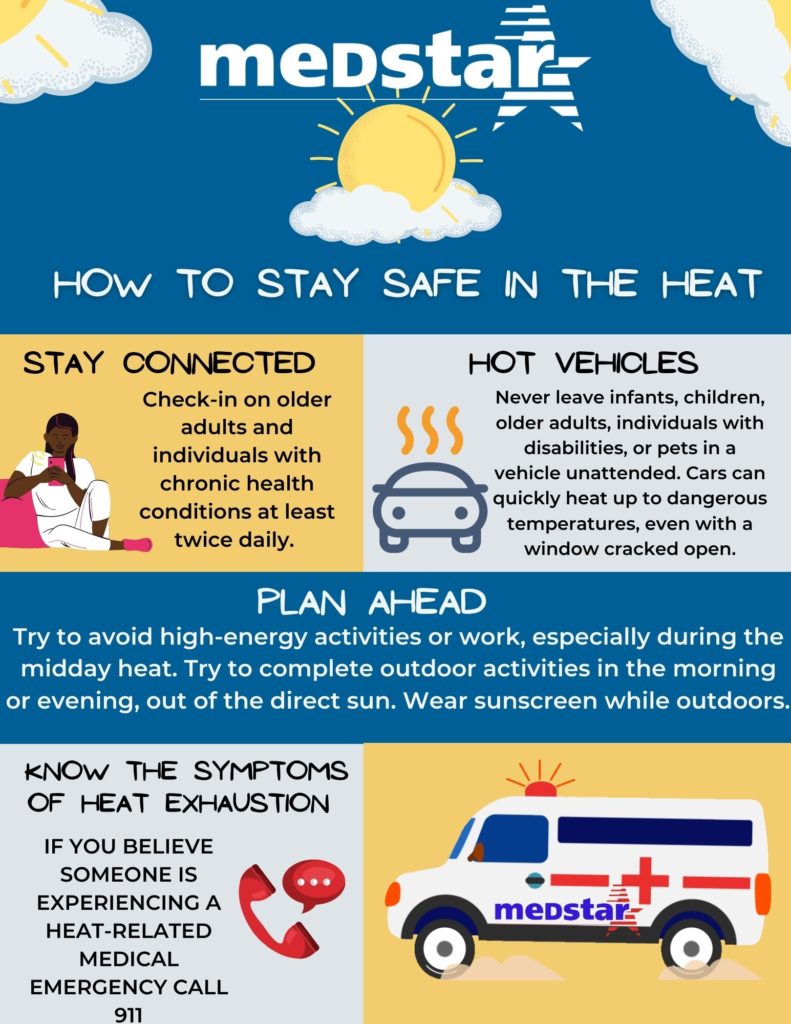How to stay safe during a heat wave
Follow these tips to protect yourself
Stay Connected
- Never leave infants, children, older adults, individuals with disabilities, or pets in a vehicle unattended. Cars can quickly heat up to dangerous temperatures, even with a window cracked open.
- Check-in on older adults and individuals with chronic health conditions at least twice daily. When visiting, ask yourself these questions:
- Are they drinking enough water?
- Do they have access to air conditioning?
- Do they know how to keep cool?
- Do they show any signs of heat stress?
- Be on the lookout for signs of heat-related illness. Act right away if you notice someone with symptoms.

Stay Cool
- Stay cool indoors: stay in an air-conditioned place as much as possible.
- Don’t use an electric fan when the indoor air temperature is over 95°F. Using a fan can be more harmful than helpful when indoor air temperatures are hotter than your body temperature. Fan use may cause your body to gain heat instead of losing it.
- Focus on staying hydrated, taking a cool shower or bath to cool your body, shutting out the sun and heat with curtains, and moving to an air-conditioned place to cool off.
- Use your stove and oven less.
- Schedule outdoor work and other activities carefully: Try to limit your outdoor activity to when it’s coolest, such as during morning and evening hours. Rest often in shady areas so that your body has a chance to recover.
- Cut down on exercise during the heat.
- Protect yourself from the sun outdoors by wearing a wide-brimmed hat, sunglasses, and sunscreen that says “broad spectrum” or “UVA/UVB protection.”
Clothing and Health
- Wear loose, lightweight, and light-colored clothing.
- Wear a hat wide enough to protect your face.
- Apply sunscreen of SPF 15 or higher 30 minutes before going out.
- Continue to reapply it according to direction.
- Drink cool, nonalcoholic beverages.
- Drinking sports drinks help replace valuable salt and minerals lost by sweating.
- Ensure that others with you stay hydrated as well.
- Take frequent rest breaks.
Outdoors
- Never leave people or pets in a closed vehicle.
- Find shade.
- Try to avoid high-energy activities or work, especially during the midday heat. Try to complete outdoor activities in the morning or evening, out of the direct sun.
Indoors
- If possible, seek an air-conditioned environment.
- If you don’t have air conditioning, consider visiting an air-conditioned shopping mall or public library to cool off.
- If possible, remain indoors in the heat of the day.
Pets
- If pets are outside, ensure they have plenty of cool water and access to comfortable shade.
- Keep food and water in the shade.
- Protect your pets’ feet from asphalt and dark pavement, which gets very hot.
- Know the symptoms of overheating in pets, including excessive panting or difficulty breathing, increased heart and respiratory rate, drooling, mild weakness, stupor, or even collapse. Symptoms can also include seizures, bloody diarrhea, vomit, and an elevated body temperature of over 104 degrees.
- Animals with flat faces, like Pugs and Persian cats, are more susceptible to heat stroke since they cannot pant as effectively. These pets, along with the elderly, the overweight, and those with heart or lung diseases, should be kept cool in air-conditioned rooms as much as possible.
Heat-Related Illness
Dehydration means your body does not have as much water and fluids as it should. Dehydration can be caused by losing too much liquid, not drinking enough water or fluids, or both.
The most apparent symptom is thirst; however, you may also experience:
- Headache
- Eyes stop making tears
- Sweating may stop
- Muscle cramps
- Nausea and vomiting
- Heart palpitations
- Light-headedness (especially when standing)
IF YOU BELIEVE SOMEONE IS EXPERIENCING A HEAT-RELATED MEDICAL EMERGENCY, CALL 911
